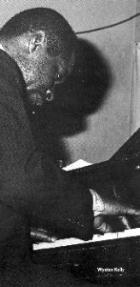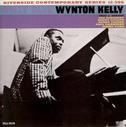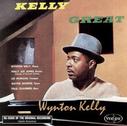
Wynton Kelly on Piano at the Jazznote
Though raised in Brooklyn since the age of four, pianist Wynton Kelly was actually born in Jamaica December 2, 1931. Making his professional debut in 1943, Kelly was touring the Caribbean with the Ray Abrams combo by age 15. This would be followed by stints with R&B groups led by Hal "Cornbread" Singer and Eddie "Lockjaw" Davis, and later, as accompanist to Dinah Washington.
Kelly attracted attention playing with Lester Young and Dizzy Gillespie. After a stint in the army from 1952-54, Kelly rejoined Gillespie, this time in the context of his Big Band which included tenorist Benny Golson and a teenage Lee Morgan on trumpet, contemporaries that would record together in various combinations in the years to come. Leaving Gillespie to form his own trio in December, 1957, he joined Miles Davis in 1959, replacing Bill Evans (Kelly can be heard on one track of Kind of Blue).
Around the same time he made his debut with Davis on Kind of Blue (which was March 2, 1959) Kelly recorded some of his finest sessions as leader for the Vee-Jay record label:

 Originally intended for release on the Riverside label, Kelly Blue (the title bearing a striking resemblance to Kind of Blue being recorded at that time) is primarily a preview of the future Wynton Kelly Trio, as it features for the most part his fellow rhythm section mates from the Miles Davis bands, bassist Paul Chambers and drummer Jimmy Cobb. "Kelly Blue" and "Keep It Moving" add cornetist Nat Adderley, flutist Bobby Jaspar and the tenor of former Gillespie bandmate Benny Golson on tenor. The CD reissue expands the original program with a previously unreleased "Do Nothin' Till You Hear From Me" and an alternate take of "Keep It Moving." The set features three of Kelly's own compositions, a smattering of familiar standards, and some fine bop piano solo-work. This album is highly recommended.
Originally intended for release on the Riverside label, Kelly Blue (the title bearing a striking resemblance to Kind of Blue being recorded at that time) is primarily a preview of the future Wynton Kelly Trio, as it features for the most part his fellow rhythm section mates from the Miles Davis bands, bassist Paul Chambers and drummer Jimmy Cobb. "Kelly Blue" and "Keep It Moving" add cornetist Nat Adderley, flutist Bobby Jaspar and the tenor of former Gillespie bandmate Benny Golson on tenor. The CD reissue expands the original program with a previously unreleased "Do Nothin' Till You Hear From Me" and an alternate take of "Keep It Moving." The set features three of Kelly's own compositions, a smattering of familiar standards, and some fine bop piano solo-work. This album is highly recommended.

 On Kelly Great (recorded August 12, 1959) the pianist teams up with former Gillespie bandmate Lee Morgan on trumpet and tenor saxophonist Wayne Shorter (just then launching into his tenure with Art Blakey's Jazz Messengers, replacing Benny Golson). Also present are bassist Paul Chambers and drummer Philly Joe Jones. Interestingly a similar line-up (with Jimmy Cobb replacing Jones on drums) would record together on Shorter's own leader debut on Vee-Jay four months later. The play list for Kelly Great features four originals by Kelly, Shorter and Morgan. But it is the single standard, "June Night", which rises as the highlight. This album represents a fantastic session by an excellent lineup. Unfortunately, at 35 minutes, the CD falls short of 'essential'.
On Kelly Great (recorded August 12, 1959) the pianist teams up with former Gillespie bandmate Lee Morgan on trumpet and tenor saxophonist Wayne Shorter (just then launching into his tenure with Art Blakey's Jazz Messengers, replacing Benny Golson). Also present are bassist Paul Chambers and drummer Philly Joe Jones. Interestingly a similar line-up (with Jimmy Cobb replacing Jones on drums) would record together on Shorter's own leader debut on Vee-Jay four months later. The play list for Kelly Great features four originals by Kelly, Shorter and Morgan. But it is the single standard, "June Night", which rises as the highlight. This album represents a fantastic session by an excellent lineup. Unfortunately, at 35 minutes, the CD falls short of 'essential'.

 Though overshadowed by his employer's album of the same title, Wynton Kelly's Someday My Prince Will Come is a jazz classic of trio sessions recorded September 20 and 21, 1961. Whether accompanied by Sam Jones (b) and Jimmy Cobb (d) or bassist Paul Chambers and drummer Philly Joe Jones Kelly keeps the session alive and swinging. The track "Wrinkles" has some extra flavor thrown in with visiting Jazz Messengers Lee Morgan on trumpet and Wayne Shorter on tenor. Highly recommended by the Jazznote, the CD reissue supplements the original ten song program with an additional five alternate takes.
Though overshadowed by his employer's album of the same title, Wynton Kelly's Someday My Prince Will Come is a jazz classic of trio sessions recorded September 20 and 21, 1961. Whether accompanied by Sam Jones (b) and Jimmy Cobb (d) or bassist Paul Chambers and drummer Philly Joe Jones Kelly keeps the session alive and swinging. The track "Wrinkles" has some extra flavor thrown in with visiting Jazz Messengers Lee Morgan on trumpet and Wayne Shorter on tenor. Highly recommended by the Jazznote, the CD reissue supplements the original ten song program with an additional five alternate takes.
Kelly left the Davis fold in 1963 to form a trio with fellow rhythm section bandmates Paul Chambers (b) and Jimmy Cobb (d), recording as the Wynton Kelly Trio as well as rhythm support for Wes Montgomery. Kelly died on April 12, 1971 of an epileptic seizure at the age of 40.

HOME | TOP | ARTISTS

 Originally intended for release on the Riverside label, Kelly Blue (the title bearing a striking resemblance to Kind of Blue being recorded at that time) is primarily a preview of the future Wynton Kelly Trio, as it features for the most part his fellow rhythm section mates from the Miles Davis bands, bassist Paul Chambers and drummer Jimmy Cobb. "Kelly Blue" and "Keep It Moving" add cornetist Nat Adderley, flutist Bobby Jaspar and the tenor of former Gillespie bandmate Benny Golson on tenor. The CD reissue expands the original program with a previously unreleased "Do Nothin' Till You Hear From Me" and an alternate take of "Keep It Moving." The set features three of Kelly's own compositions, a smattering of familiar standards, and some fine bop piano solo-work. This album is highly recommended.
Originally intended for release on the Riverside label, Kelly Blue (the title bearing a striking resemblance to Kind of Blue being recorded at that time) is primarily a preview of the future Wynton Kelly Trio, as it features for the most part his fellow rhythm section mates from the Miles Davis bands, bassist Paul Chambers and drummer Jimmy Cobb. "Kelly Blue" and "Keep It Moving" add cornetist Nat Adderley, flutist Bobby Jaspar and the tenor of former Gillespie bandmate Benny Golson on tenor. The CD reissue expands the original program with a previously unreleased "Do Nothin' Till You Hear From Me" and an alternate take of "Keep It Moving." The set features three of Kelly's own compositions, a smattering of familiar standards, and some fine bop piano solo-work. This album is highly recommended.


 Though overshadowed by his employer's album of the same title, Wynton Kelly's Someday My Prince Will Come is a jazz classic of trio sessions recorded September 20 and 21, 1961. Whether accompanied by Sam Jones (b) and Jimmy Cobb (d) or bassist
Though overshadowed by his employer's album of the same title, Wynton Kelly's Someday My Prince Will Come is a jazz classic of trio sessions recorded September 20 and 21, 1961. Whether accompanied by Sam Jones (b) and Jimmy Cobb (d) or bassist